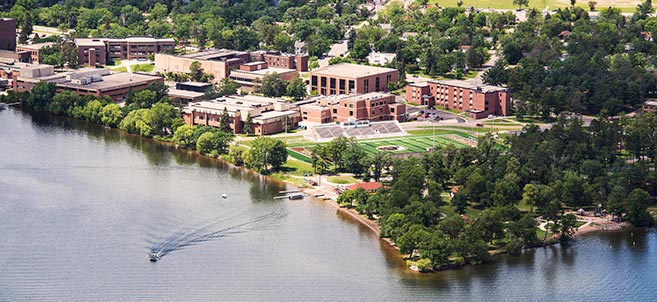
While most of the attention on the issue of concussions in sports has been focused on football, any athletic activities that involve collisions or potential impacts to the head bring with them a risk of concussion. Dr. James White, associate professor of human performance, sport and health at Bemidji State University will be co-presenting on the current state of concussion research as part of the university’s Honors Council Lecture Series.
White and Dr. Thayne Munce from the Sanford Sports Science Institute will present “Current Research in Sport Concussion,” Oct. 13 at 7 p.m. in Hagg-Sauer Hall 112. BSU’s Honors Council lectures are open to everyone free of charge.
National news headlines have prominently featured National Football League players and their issues with concussive head injuries, and serious injuries and deaths from head impacts during downhill skiing also have received significant attention.
White and Munce will discuss this emerging societal interest in head impact exposure and concussions, while reviewing studies that have investigated associations between head impact exposure in football and brain injury or functional impairment.
Munce, who has been exploring concussions in junior high-school aged football players, will discuss his research on the differences in head-impact exposure by age and position played which is part of an ongoing study in South Dakota.
White and Munce also will discuss the frequency and types of injuries, including those to the head, that have occurred at a small ski area located in the upper-Midwest during the past decade.
About Dr. Jim White
Dr. Jim White is an associate professor of human performance, sport and health at Bemidji State. He coordinates and supervises internship and practicum experiences and advises more htan 50 undergraduate students each year. Dr. White has been working full time in the health and fitness promotion field for 20 years. Prior to his move to academia he spent nine years as an exercise physiologist at MeritCare Health Systems (now Sanford Health) in Fargo, N.D., where he cared for patients with chronic disease. White holds certifications from the American College of Sports Medicine as a Clinical Exercise Physiologist and the National Strength and Conditioning Association as a Certified Strength and Conditioning Specialist.
About Dr. Thayne Munce
Dr. Thayne Munce is director of research and development at the Sanford Sports Science Institute in Sioux Falls, S.D., and also is an associate scientist in the Children’s Health Research Center at Sanford Research. In addition, he is an associate professor of pediatrics at the University of South Dakota’s Sanford School of Medicine. Munce serves on the leadership board of the National Youth Sports Health and Safety Institute and is a member of the American College of Sports Medicine. Much of his current research focuses on head impact exposure and brain health in youth football players. This work has been published and presented in leading scientific journals and international sports medicine meetings.
About the Honors Council Lecture Series
The Honors Council Lecture Series is hosted by the Bemidji State University Honors Council. The council is the advisory group to the honors program composed of 12 faculty members representing each of the university’s colleges. Student representatives are also elected to the council by their cohorts for one-year terms.
Contacts
• Kari Caughey, BSU honors program; (218) 755-3984, kcaughey@bemidjistate.edu
• Dr. James White, associate professor of human performance, sport and health; (218) 755-2766, jwhite@bemidjistate.edu
Bemidji State University, located in northern Minnesota’s lake district, occupies a wooded campus along the shore of Lake Bemidji. Enrolling nearly 5,000 students, Bemidji State offers more than 80 undergraduate majors and 11 graduate degrees encompassing arts, sciences and select professional programs. BSU is a member of the Minnesota State Colleges and Universities system and has a faculty and staff of more than 550. University signature themes include environmental stewardship, civic engagement and global and multi-cultural understanding.
